Early Childhood Curriculum: Analysis and Literature Review Report
VerifiedAdded on 2023/06/07
|29
|5989
|313
Report
AI Summary
This report provides a comprehensive overview of early childhood curriculum, focusing on the content that supports children's learning and development. The introduction defines the concept of early childhood curriculum and its importance in fostering active and engaged learning experiences. The report includes a literature review, a references section, and a literature matrix that analyzes various sources related to early childhood education. The literature review examines essential childhood curriculums required for children's learning and development. The references section provides a list of sources used in the report, including books, journal articles, and other scholarly works. The literature matrix offers a detailed analysis of different perspectives on early childhood curriculum. The report also discusses the goals of early childhood curriculum, which are to create desired education outcomes for children and to assist them in developing their knowledge and skills. This report is a valuable resource for educators, researchers, and anyone interested in the field of early childhood education.
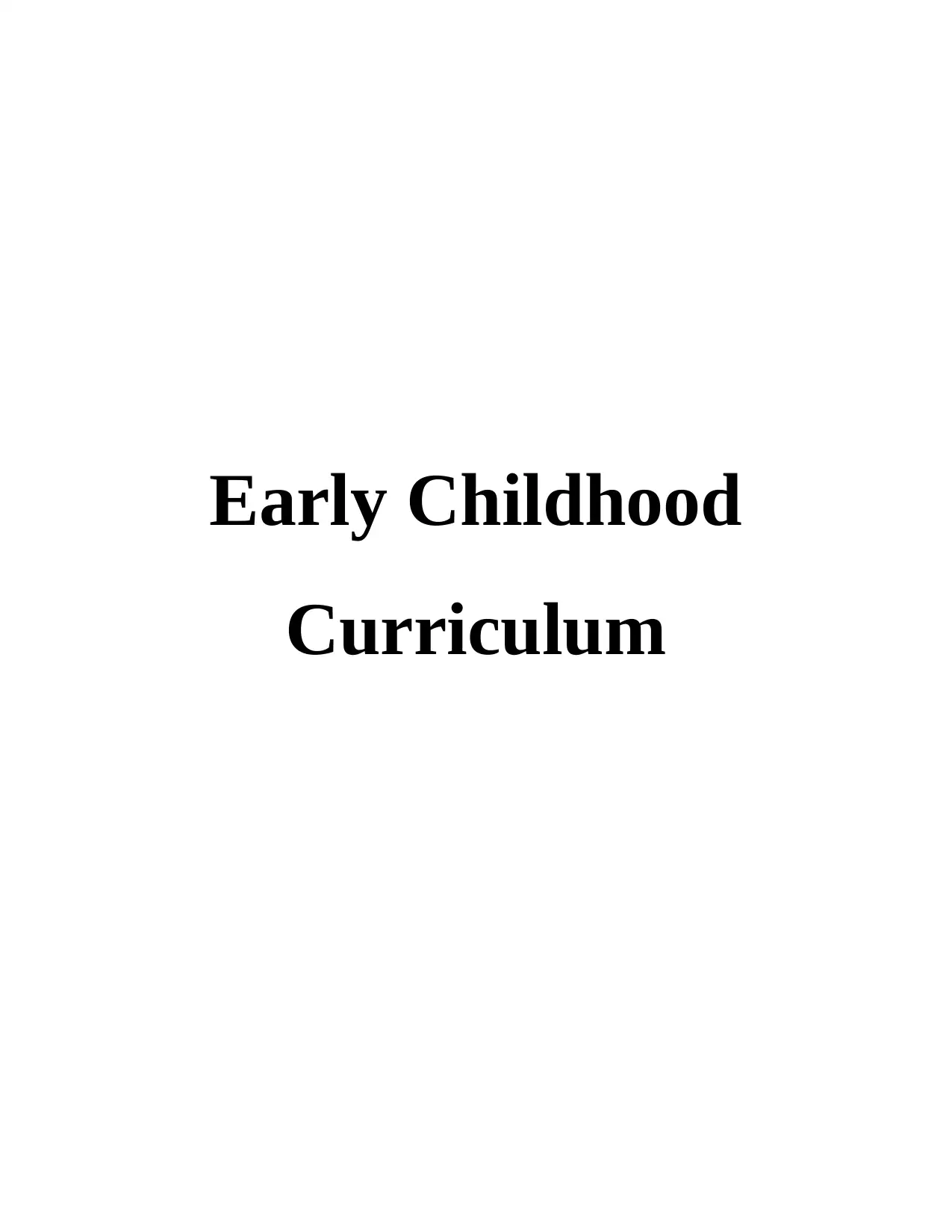
Early Childhood
Curriculum
Curriculum
Paraphrase This Document
Need a fresh take? Get an instant paraphrase of this document with our AI Paraphraser
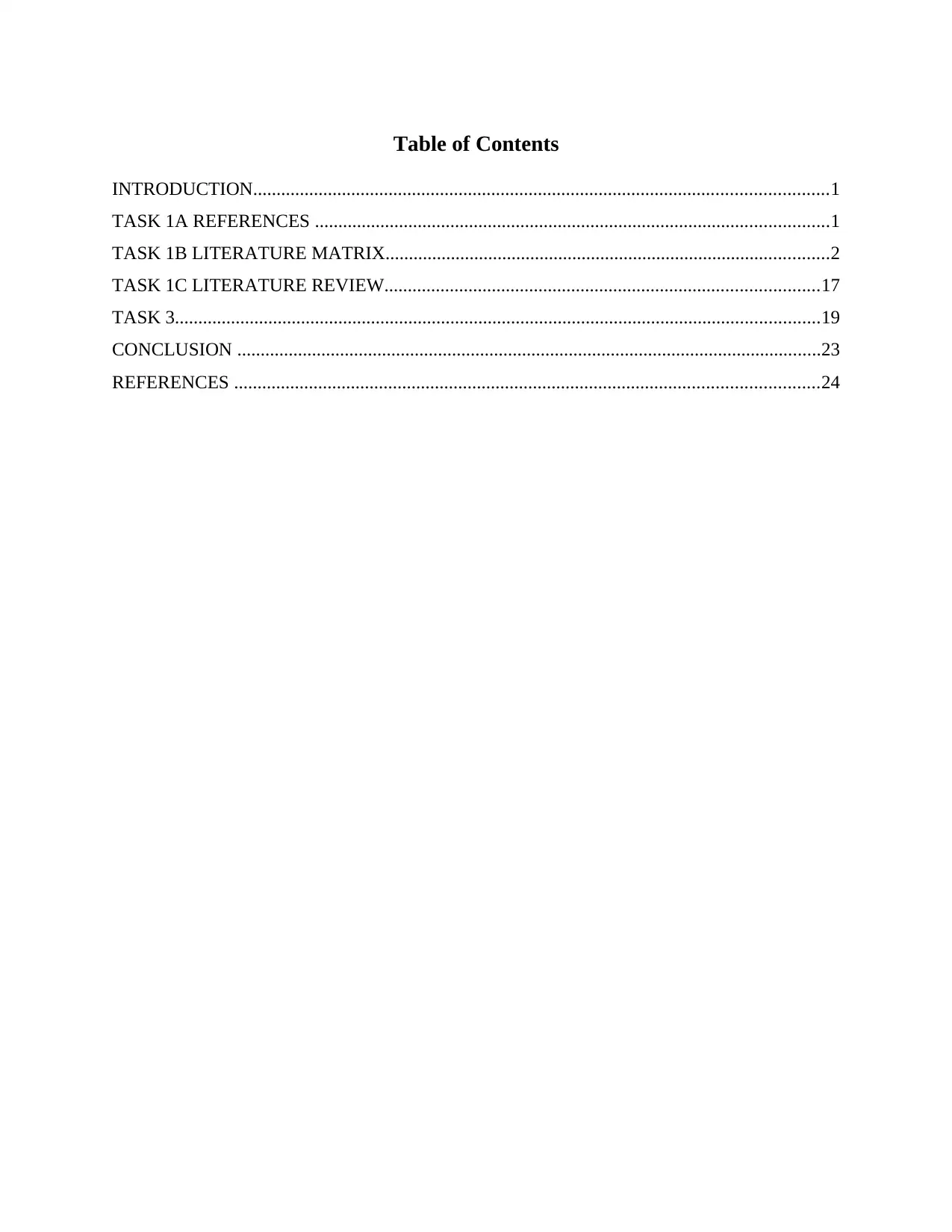
Table of Contents
INTRODUCTION...........................................................................................................................1
TASK 1A REFERENCES ..............................................................................................................1
TASK 1B LITERATURE MATRIX...............................................................................................2
TASK 1C LITERATURE REVIEW.............................................................................................17
TASK 3..........................................................................................................................................19
CONCLUSION .............................................................................................................................23
REFERENCES .............................................................................................................................24
INTRODUCTION...........................................................................................................................1
TASK 1A REFERENCES ..............................................................................................................1
TASK 1B LITERATURE MATRIX...............................................................................................2
TASK 1C LITERATURE REVIEW.............................................................................................17
TASK 3..........................................................................................................................................19
CONCLUSION .............................................................................................................................23
REFERENCES .............................................................................................................................24
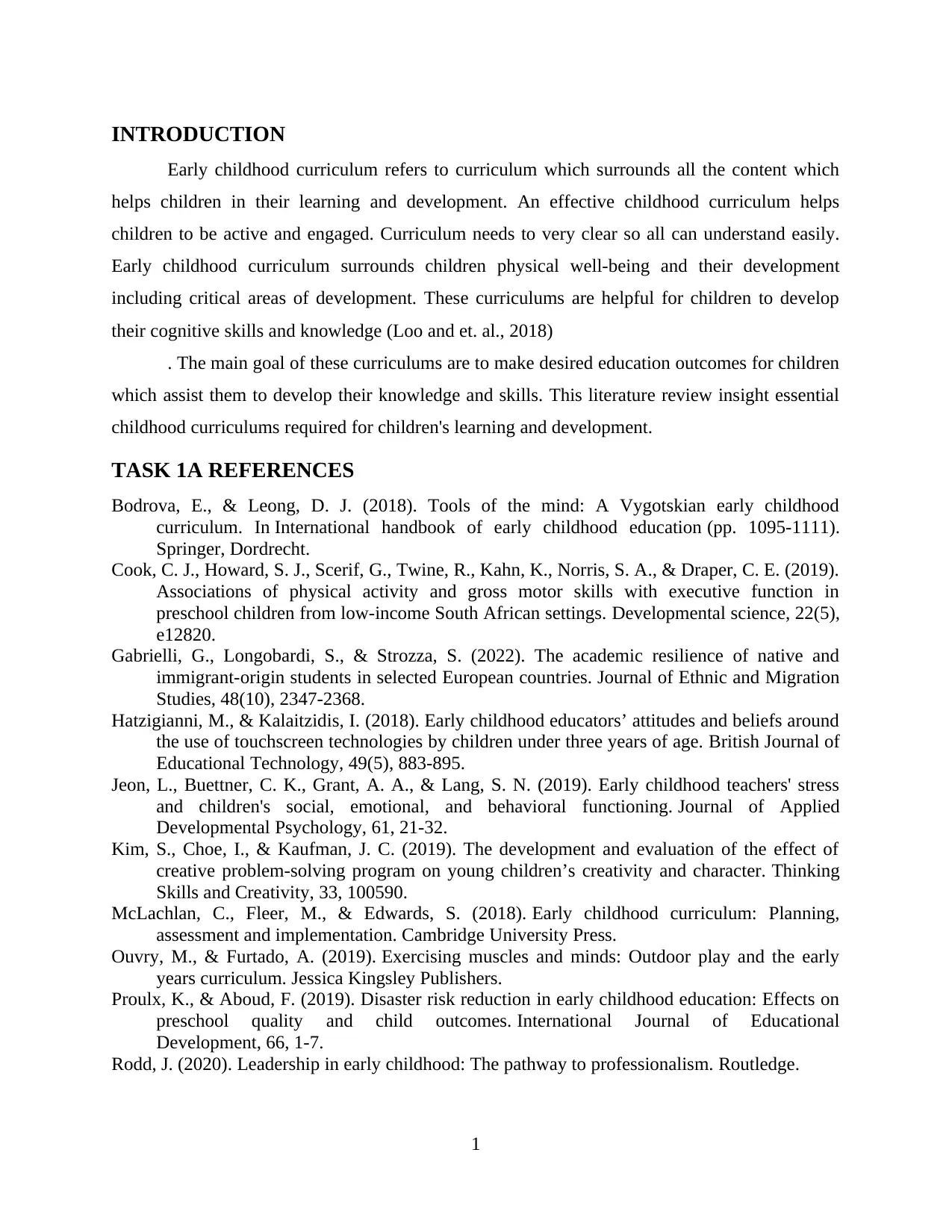
INTRODUCTION
Early childhood curriculum refers to curriculum which surrounds all the content which
helps children in their learning and development. An effective childhood curriculum helps
children to be active and engaged. Curriculum needs to very clear so all can understand easily.
Early childhood curriculum surrounds children physical well-being and their development
including critical areas of development. These curriculums are helpful for children to develop
their cognitive skills and knowledge (Loo and et. al., 2018)
. The main goal of these curriculums are to make desired education outcomes for children
which assist them to develop their knowledge and skills. This literature review insight essential
childhood curriculums required for children's learning and development.
TASK 1A REFERENCES
Bodrova, E., & Leong, D. J. (2018). Tools of the mind: A Vygotskian early childhood
curriculum. In International handbook of early childhood education (pp. 1095-1111).
Springer, Dordrecht.
Cook, C. J., Howard, S. J., Scerif, G., Twine, R., Kahn, K., Norris, S. A., & Draper, C. E. (2019).
Associations of physical activity and gross motor skills with executive function in
preschool children from low‐income South African settings. Developmental science, 22(5),
e12820.
Gabrielli, G., Longobardi, S., & Strozza, S. (2022). The academic resilience of native and
immigrant-origin students in selected European countries. Journal of Ethnic and Migration
Studies, 48(10), 2347-2368.
Hatzigianni, M., & Kalaitzidis, I. (2018). Early childhood educators’ attitudes and beliefs around
the use of touchscreen technologies by children under three years of age. British Journal of
Educational Technology, 49(5), 883-895.
Jeon, L., Buettner, C. K., Grant, A. A., & Lang, S. N. (2019). Early childhood teachers' stress
and children's social, emotional, and behavioral functioning. Journal of Applied
Developmental Psychology, 61, 21-32.
Kim, S., Choe, I., & Kaufman, J. C. (2019). The development and evaluation of the effect of
creative problem-solving program on young children’s creativity and character. Thinking
Skills and Creativity, 33, 100590.
McLachlan, C., Fleer, M., & Edwards, S. (2018). Early childhood curriculum: Planning,
assessment and implementation. Cambridge University Press.
Ouvry, M., & Furtado, A. (2019). Exercising muscles and minds: Outdoor play and the early
years curriculum. Jessica Kingsley Publishers.
Proulx, K., & Aboud, F. (2019). Disaster risk reduction in early childhood education: Effects on
preschool quality and child outcomes. International Journal of Educational
Development, 66, 1-7.
Rodd, J. (2020). Leadership in early childhood: The pathway to professionalism. Routledge.
1
Early childhood curriculum refers to curriculum which surrounds all the content which
helps children in their learning and development. An effective childhood curriculum helps
children to be active and engaged. Curriculum needs to very clear so all can understand easily.
Early childhood curriculum surrounds children physical well-being and their development
including critical areas of development. These curriculums are helpful for children to develop
their cognitive skills and knowledge (Loo and et. al., 2018)
. The main goal of these curriculums are to make desired education outcomes for children
which assist them to develop their knowledge and skills. This literature review insight essential
childhood curriculums required for children's learning and development.
TASK 1A REFERENCES
Bodrova, E., & Leong, D. J. (2018). Tools of the mind: A Vygotskian early childhood
curriculum. In International handbook of early childhood education (pp. 1095-1111).
Springer, Dordrecht.
Cook, C. J., Howard, S. J., Scerif, G., Twine, R., Kahn, K., Norris, S. A., & Draper, C. E. (2019).
Associations of physical activity and gross motor skills with executive function in
preschool children from low‐income South African settings. Developmental science, 22(5),
e12820.
Gabrielli, G., Longobardi, S., & Strozza, S. (2022). The academic resilience of native and
immigrant-origin students in selected European countries. Journal of Ethnic and Migration
Studies, 48(10), 2347-2368.
Hatzigianni, M., & Kalaitzidis, I. (2018). Early childhood educators’ attitudes and beliefs around
the use of touchscreen technologies by children under three years of age. British Journal of
Educational Technology, 49(5), 883-895.
Jeon, L., Buettner, C. K., Grant, A. A., & Lang, S. N. (2019). Early childhood teachers' stress
and children's social, emotional, and behavioral functioning. Journal of Applied
Developmental Psychology, 61, 21-32.
Kim, S., Choe, I., & Kaufman, J. C. (2019). The development and evaluation of the effect of
creative problem-solving program on young children’s creativity and character. Thinking
Skills and Creativity, 33, 100590.
McLachlan, C., Fleer, M., & Edwards, S. (2018). Early childhood curriculum: Planning,
assessment and implementation. Cambridge University Press.
Ouvry, M., & Furtado, A. (2019). Exercising muscles and minds: Outdoor play and the early
years curriculum. Jessica Kingsley Publishers.
Proulx, K., & Aboud, F. (2019). Disaster risk reduction in early childhood education: Effects on
preschool quality and child outcomes. International Journal of Educational
Development, 66, 1-7.
Rodd, J. (2020). Leadership in early childhood: The pathway to professionalism. Routledge.
1
⊘ This is a preview!⊘
Do you want full access?
Subscribe today to unlock all pages.

Trusted by 1+ million students worldwide
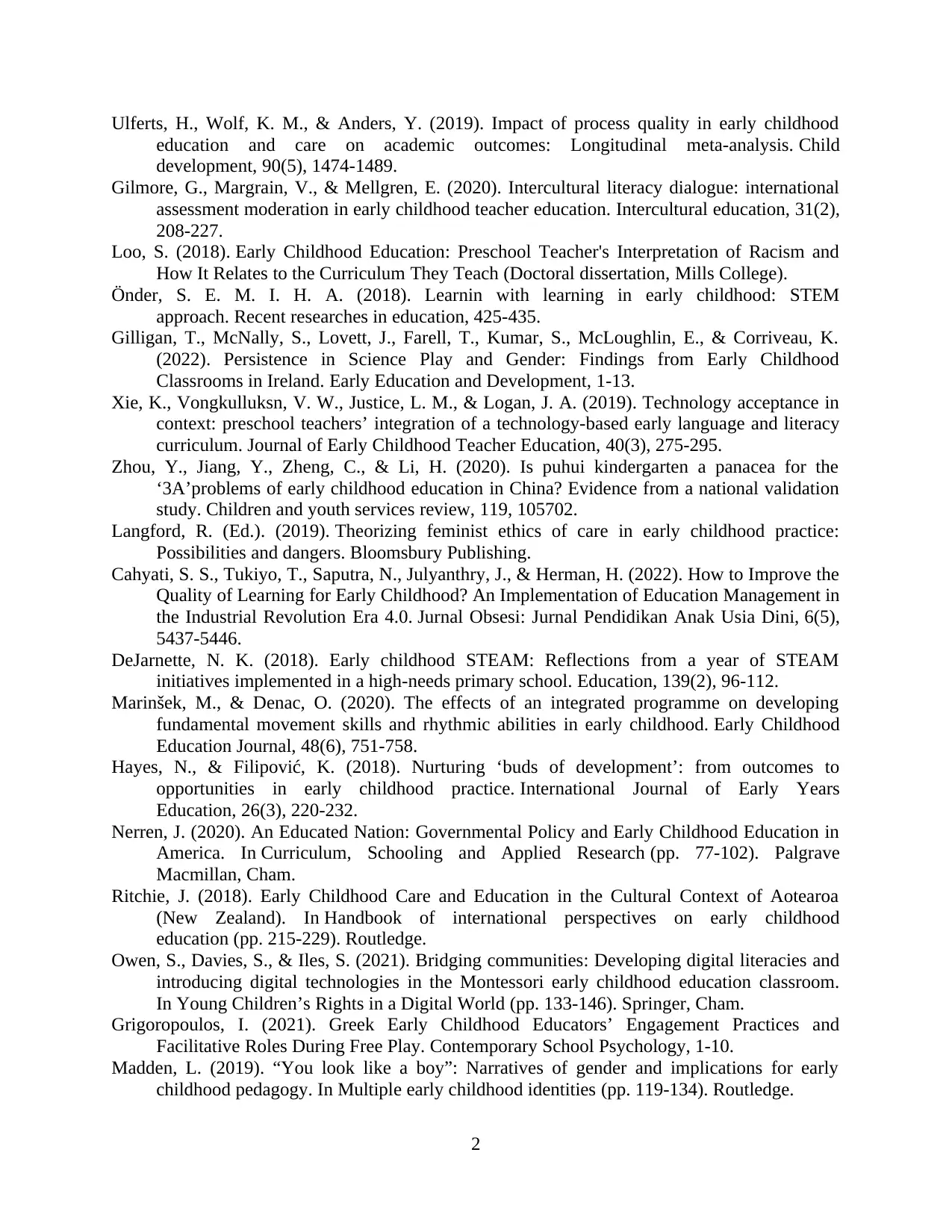
Ulferts, H., Wolf, K. M., & Anders, Y. (2019). Impact of process quality in early childhood
education and care on academic outcomes: Longitudinal meta‐analysis. Child
development, 90(5), 1474-1489.
Gilmore, G., Margrain, V., & Mellgren, E. (2020). Intercultural literacy dialogue: international
assessment moderation in early childhood teacher education. Intercultural education, 31(2),
208-227.
Loo, S. (2018). Early Childhood Education: Preschool Teacher's Interpretation of Racism and
How It Relates to the Curriculum They Teach (Doctoral dissertation, Mills College).
Önder, S. E. M. I. H. A. (2018). Learnin with learning in early childhood: STEM
approach. Recent researches in education, 425-435.
Gilligan, T., McNally, S., Lovett, J., Farell, T., Kumar, S., McLoughlin, E., & Corriveau, K.
(2022). Persistence in Science Play and Gender: Findings from Early Childhood
Classrooms in Ireland. Early Education and Development, 1-13.
Xie, K., Vongkulluksn, V. W., Justice, L. M., & Logan, J. A. (2019). Technology acceptance in
context: preschool teachers’ integration of a technology-based early language and literacy
curriculum. Journal of Early Childhood Teacher Education, 40(3), 275-295.
Zhou, Y., Jiang, Y., Zheng, C., & Li, H. (2020). Is puhui kindergarten a panacea for the
‘3A’problems of early childhood education in China? Evidence from a national validation
study. Children and youth services review, 119, 105702.
Langford, R. (Ed.). (2019). Theorizing feminist ethics of care in early childhood practice:
Possibilities and dangers. Bloomsbury Publishing.
Cahyati, S. S., Tukiyo, T., Saputra, N., Julyanthry, J., & Herman, H. (2022). How to Improve the
Quality of Learning for Early Childhood? An Implementation of Education Management in
the Industrial Revolution Era 4.0. Jurnal Obsesi: Jurnal Pendidikan Anak Usia Dini, 6(5),
5437-5446.
DeJarnette, N. K. (2018). Early childhood STEAM: Reflections from a year of STEAM
initiatives implemented in a high-needs primary school. Education, 139(2), 96-112.
Marinšek, M., & Denac, O. (2020). The effects of an integrated programme on developing
fundamental movement skills and rhythmic abilities in early childhood. Early Childhood
Education Journal, 48(6), 751-758.
Hayes, N., & Filipović, K. (2018). Nurturing ‘buds of development’: from outcomes to
opportunities in early childhood practice. International Journal of Early Years
Education, 26(3), 220-232.
Nerren, J. (2020). An Educated Nation: Governmental Policy and Early Childhood Education in
America. In Curriculum, Schooling and Applied Research (pp. 77-102). Palgrave
Macmillan, Cham.
Ritchie, J. (2018). Early Childhood Care and Education in the Cultural Context of Aotearoa
(New Zealand). In Handbook of international perspectives on early childhood
education (pp. 215-229). Routledge.
Owen, S., Davies, S., & Iles, S. (2021). Bridging communities: Developing digital literacies and
introducing digital technologies in the Montessori early childhood education classroom.
In Young Children’s Rights in a Digital World (pp. 133-146). Springer, Cham.
Grigoropoulos, I. (2021). Greek Early Childhood Educators’ Engagement Practices and
Facilitative Roles During Free Play. Contemporary School Psychology, 1-10.
Madden, L. (2019). “You look like a boy”: Narratives of gender and implications for early
childhood pedagogy. In Multiple early childhood identities (pp. 119-134). Routledge.
2
education and care on academic outcomes: Longitudinal meta‐analysis. Child
development, 90(5), 1474-1489.
Gilmore, G., Margrain, V., & Mellgren, E. (2020). Intercultural literacy dialogue: international
assessment moderation in early childhood teacher education. Intercultural education, 31(2),
208-227.
Loo, S. (2018). Early Childhood Education: Preschool Teacher's Interpretation of Racism and
How It Relates to the Curriculum They Teach (Doctoral dissertation, Mills College).
Önder, S. E. M. I. H. A. (2018). Learnin with learning in early childhood: STEM
approach. Recent researches in education, 425-435.
Gilligan, T., McNally, S., Lovett, J., Farell, T., Kumar, S., McLoughlin, E., & Corriveau, K.
(2022). Persistence in Science Play and Gender: Findings from Early Childhood
Classrooms in Ireland. Early Education and Development, 1-13.
Xie, K., Vongkulluksn, V. W., Justice, L. M., & Logan, J. A. (2019). Technology acceptance in
context: preschool teachers’ integration of a technology-based early language and literacy
curriculum. Journal of Early Childhood Teacher Education, 40(3), 275-295.
Zhou, Y., Jiang, Y., Zheng, C., & Li, H. (2020). Is puhui kindergarten a panacea for the
‘3A’problems of early childhood education in China? Evidence from a national validation
study. Children and youth services review, 119, 105702.
Langford, R. (Ed.). (2019). Theorizing feminist ethics of care in early childhood practice:
Possibilities and dangers. Bloomsbury Publishing.
Cahyati, S. S., Tukiyo, T., Saputra, N., Julyanthry, J., & Herman, H. (2022). How to Improve the
Quality of Learning for Early Childhood? An Implementation of Education Management in
the Industrial Revolution Era 4.0. Jurnal Obsesi: Jurnal Pendidikan Anak Usia Dini, 6(5),
5437-5446.
DeJarnette, N. K. (2018). Early childhood STEAM: Reflections from a year of STEAM
initiatives implemented in a high-needs primary school. Education, 139(2), 96-112.
Marinšek, M., & Denac, O. (2020). The effects of an integrated programme on developing
fundamental movement skills and rhythmic abilities in early childhood. Early Childhood
Education Journal, 48(6), 751-758.
Hayes, N., & Filipović, K. (2018). Nurturing ‘buds of development’: from outcomes to
opportunities in early childhood practice. International Journal of Early Years
Education, 26(3), 220-232.
Nerren, J. (2020). An Educated Nation: Governmental Policy and Early Childhood Education in
America. In Curriculum, Schooling and Applied Research (pp. 77-102). Palgrave
Macmillan, Cham.
Ritchie, J. (2018). Early Childhood Care and Education in the Cultural Context of Aotearoa
(New Zealand). In Handbook of international perspectives on early childhood
education (pp. 215-229). Routledge.
Owen, S., Davies, S., & Iles, S. (2021). Bridging communities: Developing digital literacies and
introducing digital technologies in the Montessori early childhood education classroom.
In Young Children’s Rights in a Digital World (pp. 133-146). Springer, Cham.
Grigoropoulos, I. (2021). Greek Early Childhood Educators’ Engagement Practices and
Facilitative Roles During Free Play. Contemporary School Psychology, 1-10.
Madden, L. (2019). “You look like a boy”: Narratives of gender and implications for early
childhood pedagogy. In Multiple early childhood identities (pp. 119-134). Routledge.
2
Paraphrase This Document
Need a fresh take? Get an instant paraphrase of this document with our AI Paraphraser
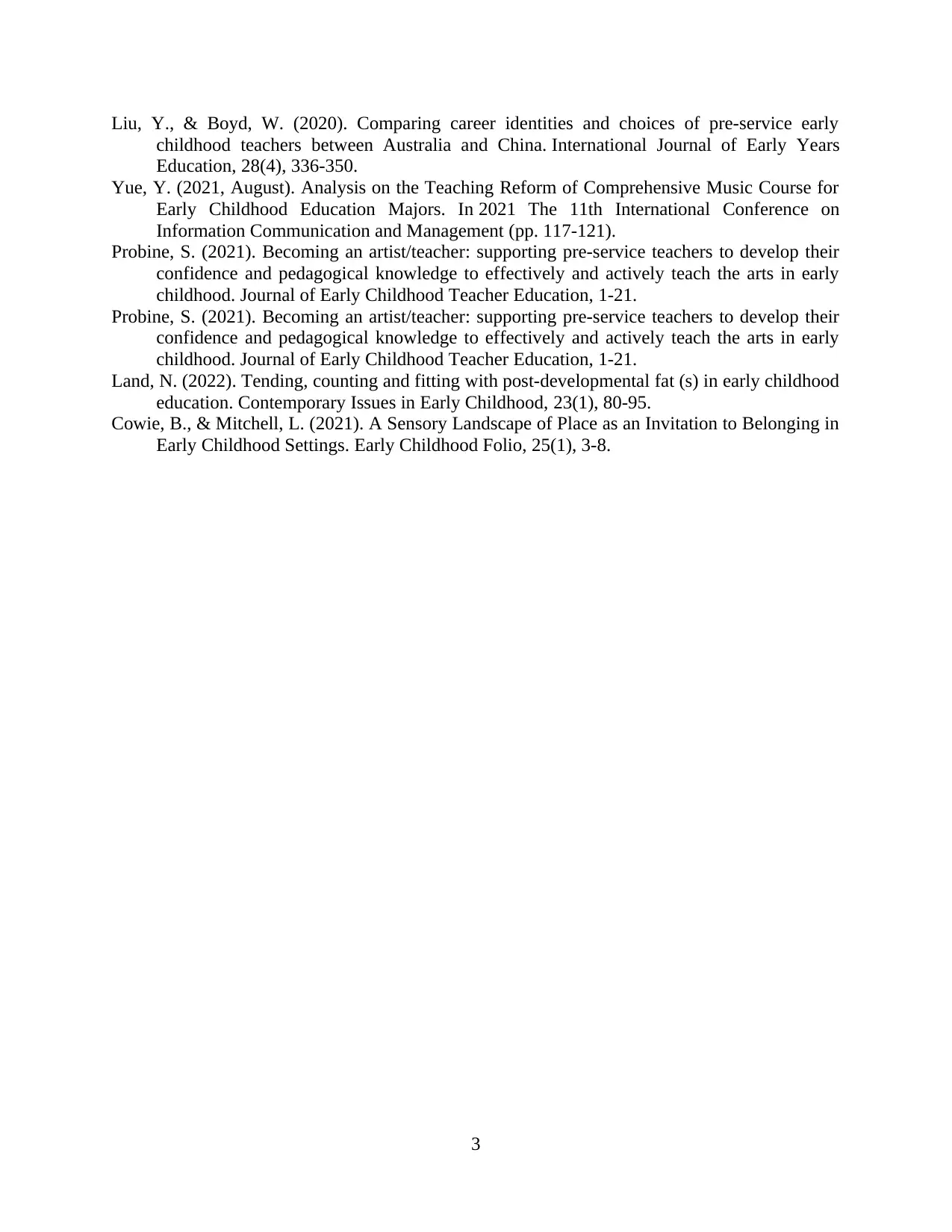
Liu, Y., & Boyd, W. (2020). Comparing career identities and choices of pre-service early
childhood teachers between Australia and China. International Journal of Early Years
Education, 28(4), 336-350.
Yue, Y. (2021, August). Analysis on the Teaching Reform of Comprehensive Music Course for
Early Childhood Education Majors. In 2021 The 11th International Conference on
Information Communication and Management (pp. 117-121).
Probine, S. (2021). Becoming an artist/teacher: supporting pre-service teachers to develop their
confidence and pedagogical knowledge to effectively and actively teach the arts in early
childhood. Journal of Early Childhood Teacher Education, 1-21.
Probine, S. (2021). Becoming an artist/teacher: supporting pre-service teachers to develop their
confidence and pedagogical knowledge to effectively and actively teach the arts in early
childhood. Journal of Early Childhood Teacher Education, 1-21.
Land, N. (2022). Tending, counting and fitting with post-developmental fat (s) in early childhood
education. Contemporary Issues in Early Childhood, 23(1), 80-95.
Cowie, B., & Mitchell, L. (2021). A Sensory Landscape of Place as an Invitation to Belonging in
Early Childhood Settings. Early Childhood Folio, 25(1), 3-8.
3
childhood teachers between Australia and China. International Journal of Early Years
Education, 28(4), 336-350.
Yue, Y. (2021, August). Analysis on the Teaching Reform of Comprehensive Music Course for
Early Childhood Education Majors. In 2021 The 11th International Conference on
Information Communication and Management (pp. 117-121).
Probine, S. (2021). Becoming an artist/teacher: supporting pre-service teachers to develop their
confidence and pedagogical knowledge to effectively and actively teach the arts in early
childhood. Journal of Early Childhood Teacher Education, 1-21.
Probine, S. (2021). Becoming an artist/teacher: supporting pre-service teachers to develop their
confidence and pedagogical knowledge to effectively and actively teach the arts in early
childhood. Journal of Early Childhood Teacher Education, 1-21.
Land, N. (2022). Tending, counting and fitting with post-developmental fat (s) in early childhood
education. Contemporary Issues in Early Childhood, 23(1), 80-95.
Cowie, B., & Mitchell, L. (2021). A Sensory Landscape of Place as an Invitation to Belonging in
Early Childhood Settings. Early Childhood Folio, 25(1), 3-8.
3
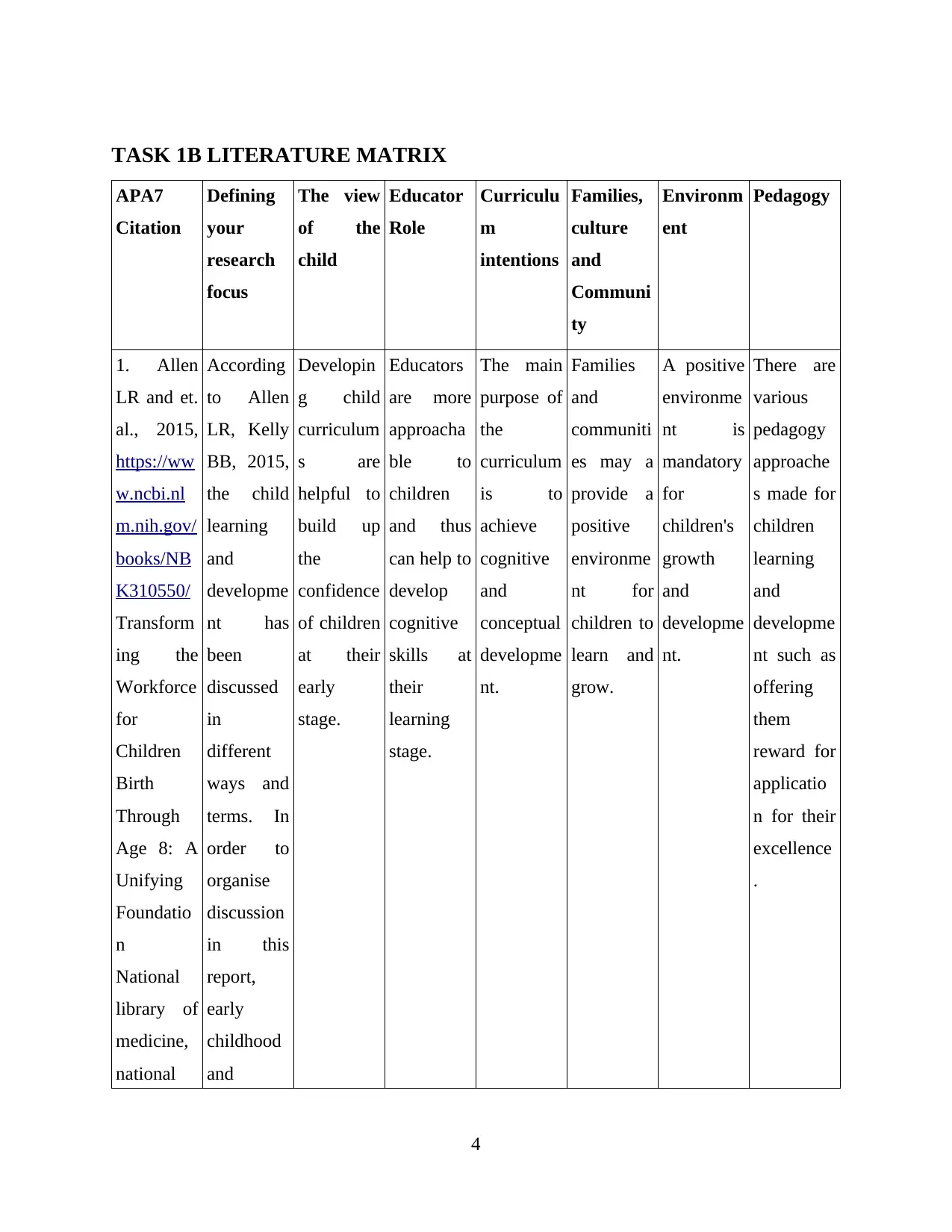
TASK 1B LITERATURE MATRIX
APA7
Citation
Defining
your
research
focus
The view
of the
child
Educator
Role
Curriculu
m
intentions
Families,
culture
and
Communi
ty
Environm
ent
Pedagogy
1. Allen
LR and et.
al., 2015,
https://ww
w.ncbi.nl
m.nih.gov/
books/NB
K310550/
Transform
ing the
Workforce
for
Children
Birth
Through
Age 8: A
Unifying
Foundatio
n
National
library of
medicine,
national
According
to Allen
LR, Kelly
BB, 2015,
the child
learning
and
developme
nt has
been
discussed
in
different
ways and
terms. In
order to
organise
discussion
in this
report,
early
childhood
and
Developin
g child
curriculum
s are
helpful to
build up
the
confidence
of children
at their
early
stage.
Educators
are more
approacha
ble to
children
and thus
can help to
develop
cognitive
skills at
their
learning
stage.
The main
purpose of
the
curriculum
is to
achieve
cognitive
and
conceptual
developme
nt.
Families
and
communiti
es may a
provide a
positive
environme
nt for
children to
learn and
grow.
A positive
environme
nt is
mandatory
for
children's
growth
and
developme
nt.
There are
various
pedagogy
approache
s made for
children
learning
and
developme
nt such as
offering
them
reward for
applicatio
n for their
excellence
.
4
APA7
Citation
Defining
your
research
focus
The view
of the
child
Educator
Role
Curriculu
m
intentions
Families,
culture
and
Communi
ty
Environm
ent
Pedagogy
1. Allen
LR and et.
al., 2015,
https://ww
w.ncbi.nl
m.nih.gov/
books/NB
K310550/
Transform
ing the
Workforce
for
Children
Birth
Through
Age 8: A
Unifying
Foundatio
n
National
library of
medicine,
national
According
to Allen
LR, Kelly
BB, 2015,
the child
learning
and
developme
nt has
been
discussed
in
different
ways and
terms. In
order to
organise
discussion
in this
report,
early
childhood
and
Developin
g child
curriculum
s are
helpful to
build up
the
confidence
of children
at their
early
stage.
Educators
are more
approacha
ble to
children
and thus
can help to
develop
cognitive
skills at
their
learning
stage.
The main
purpose of
the
curriculum
is to
achieve
cognitive
and
conceptual
developme
nt.
Families
and
communiti
es may a
provide a
positive
environme
nt for
children to
learn and
grow.
A positive
environme
nt is
mandatory
for
children's
growth
and
developme
nt.
There are
various
pedagogy
approache
s made for
children
learning
and
developme
nt such as
offering
them
reward for
applicatio
n for their
excellence
.
4
⊘ This is a preview!⊘
Do you want full access?
Subscribe today to unlock all pages.

Trusted by 1+ million students worldwide
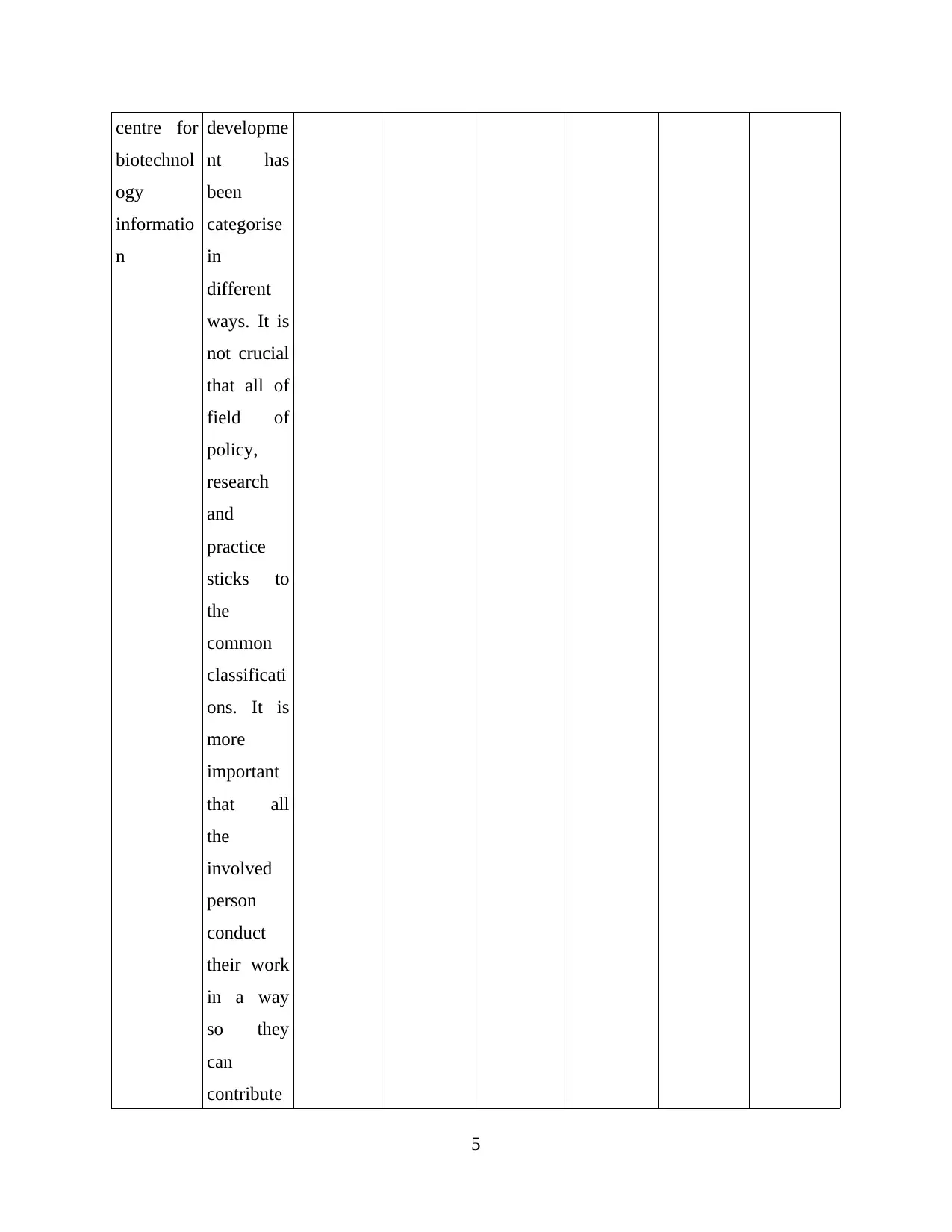
centre for
biotechnol
ogy
informatio
n
developme
nt has
been
categorise
in
different
ways. It is
not crucial
that all of
field of
policy,
research
and
practice
sticks to
the
common
classificati
ons. It is
more
important
that all
the
involved
person
conduct
their work
in a way
so they
can
contribute
5
biotechnol
ogy
informatio
n
developme
nt has
been
categorise
in
different
ways. It is
not crucial
that all of
field of
policy,
research
and
practice
sticks to
the
common
classificati
ons. It is
more
important
that all
the
involved
person
conduct
their work
in a way
so they
can
contribute
5
Paraphrase This Document
Need a fresh take? Get an instant paraphrase of this document with our AI Paraphraser
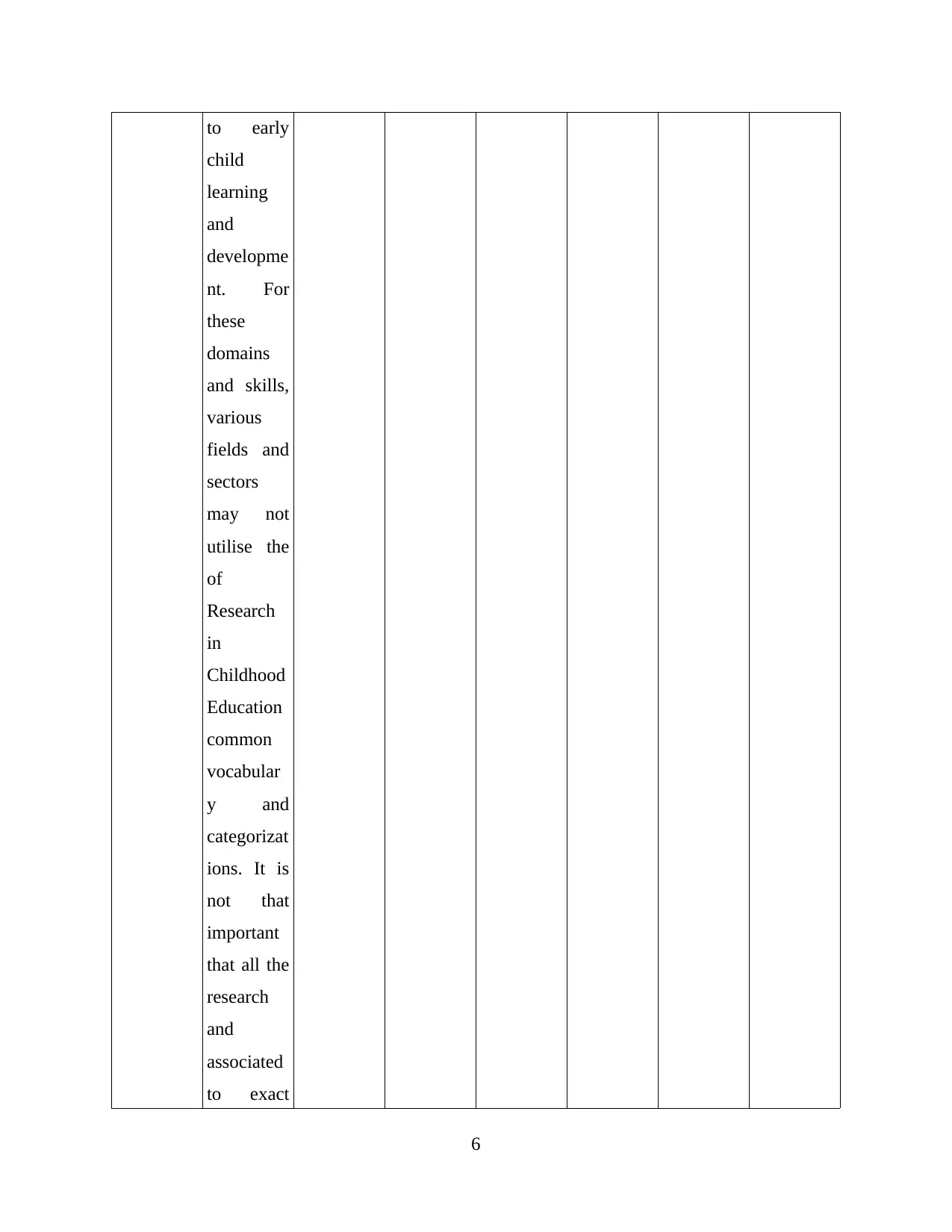
to early
child
learning
and
developme
nt. For
these
domains
and skills,
various
fields and
sectors
may not
utilise the
of
Research
in
Childhood
Education
common
vocabular
y and
categorizat
ions. It is
not that
important
that all the
research
and
associated
to exact
6
child
learning
and
developme
nt. For
these
domains
and skills,
various
fields and
sectors
may not
utilise the
of
Research
in
Childhood
Education
common
vocabular
y and
categorizat
ions. It is
not that
important
that all the
research
and
associated
to exact
6
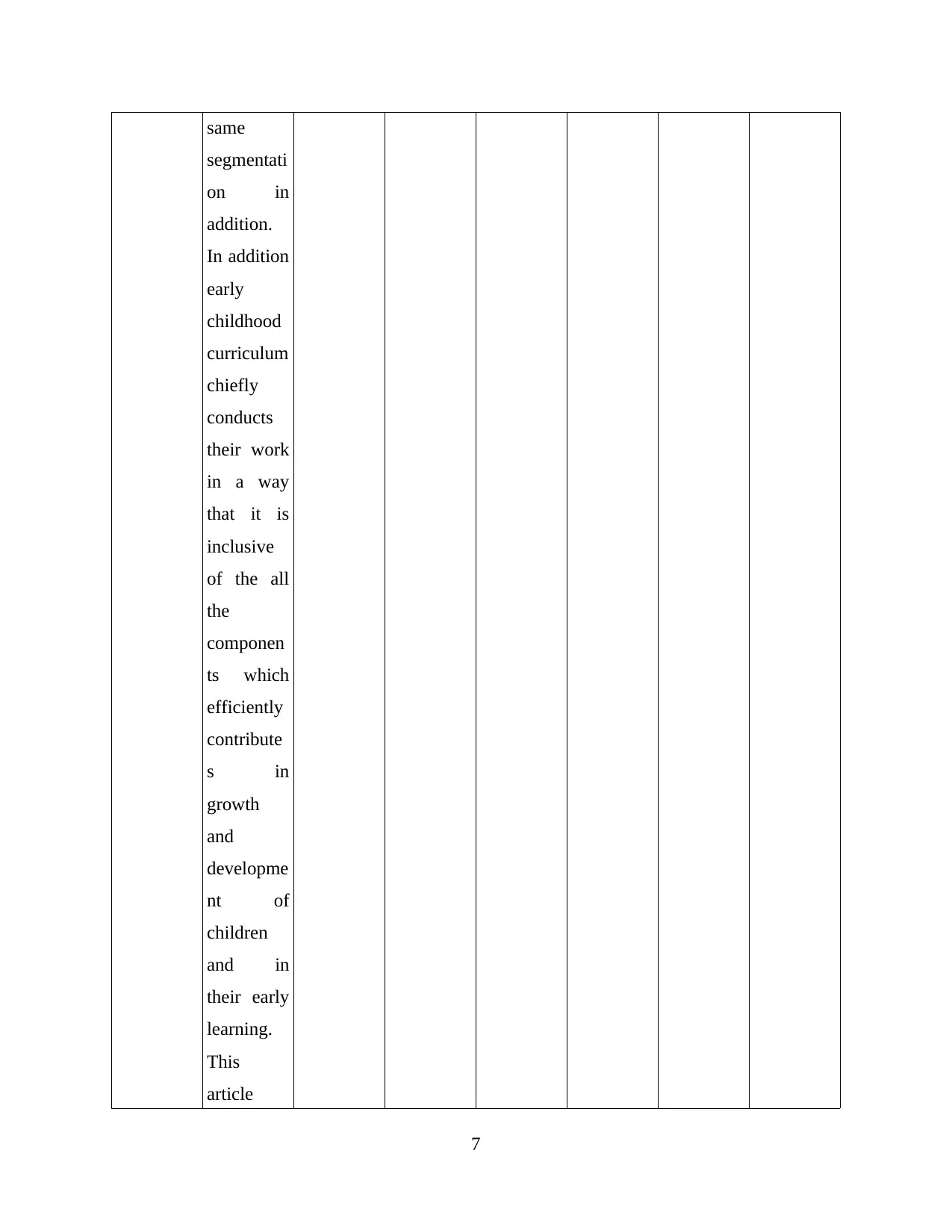
same
segmentati
on in
addition.
In addition
early
childhood
curriculum
chiefly
conducts
their work
in a way
that it is
inclusive
of the all
the
componen
ts which
efficiently
contribute
s in
growth
and
developme
nt of
children
and in
their early
learning.
This
article
7
segmentati
on in
addition.
In addition
early
childhood
curriculum
chiefly
conducts
their work
in a way
that it is
inclusive
of the all
the
componen
ts which
efficiently
contribute
s in
growth
and
developme
nt of
children
and in
their early
learning.
This
article
7
⊘ This is a preview!⊘
Do you want full access?
Subscribe today to unlock all pages.

Trusted by 1+ million students worldwide
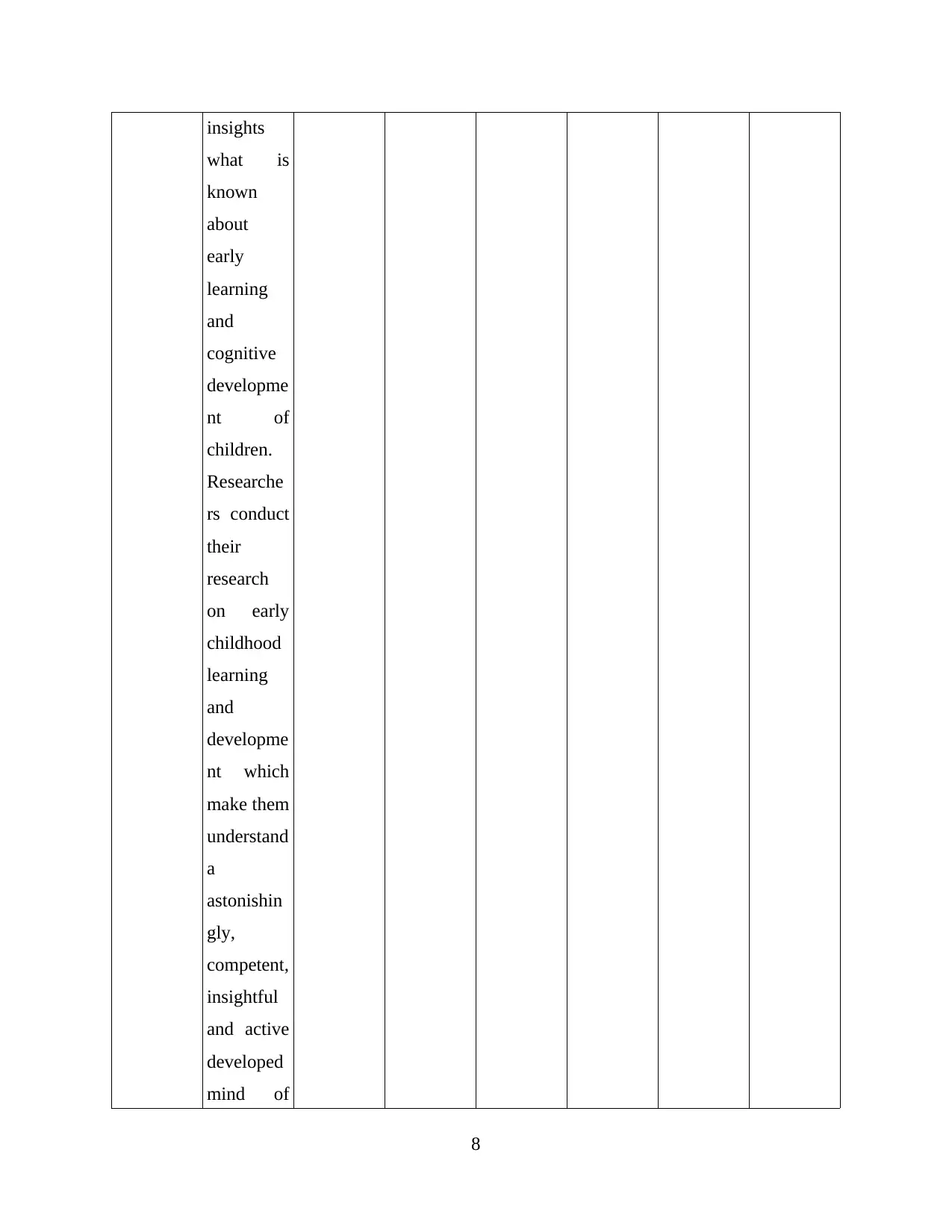
insights
what is
known
about
early
learning
and
cognitive
developme
nt of
children.
Researche
rs conduct
their
research
on early
childhood
learning
and
developme
nt which
make them
understand
a
astonishin
gly,
competent,
insightful
and active
developed
mind of
8
what is
known
about
early
learning
and
cognitive
developme
nt of
children.
Researche
rs conduct
their
research
on early
childhood
learning
and
developme
nt which
make them
understand
a
astonishin
gly,
competent,
insightful
and active
developed
mind of
8
Paraphrase This Document
Need a fresh take? Get an instant paraphrase of this document with our AI Paraphraser
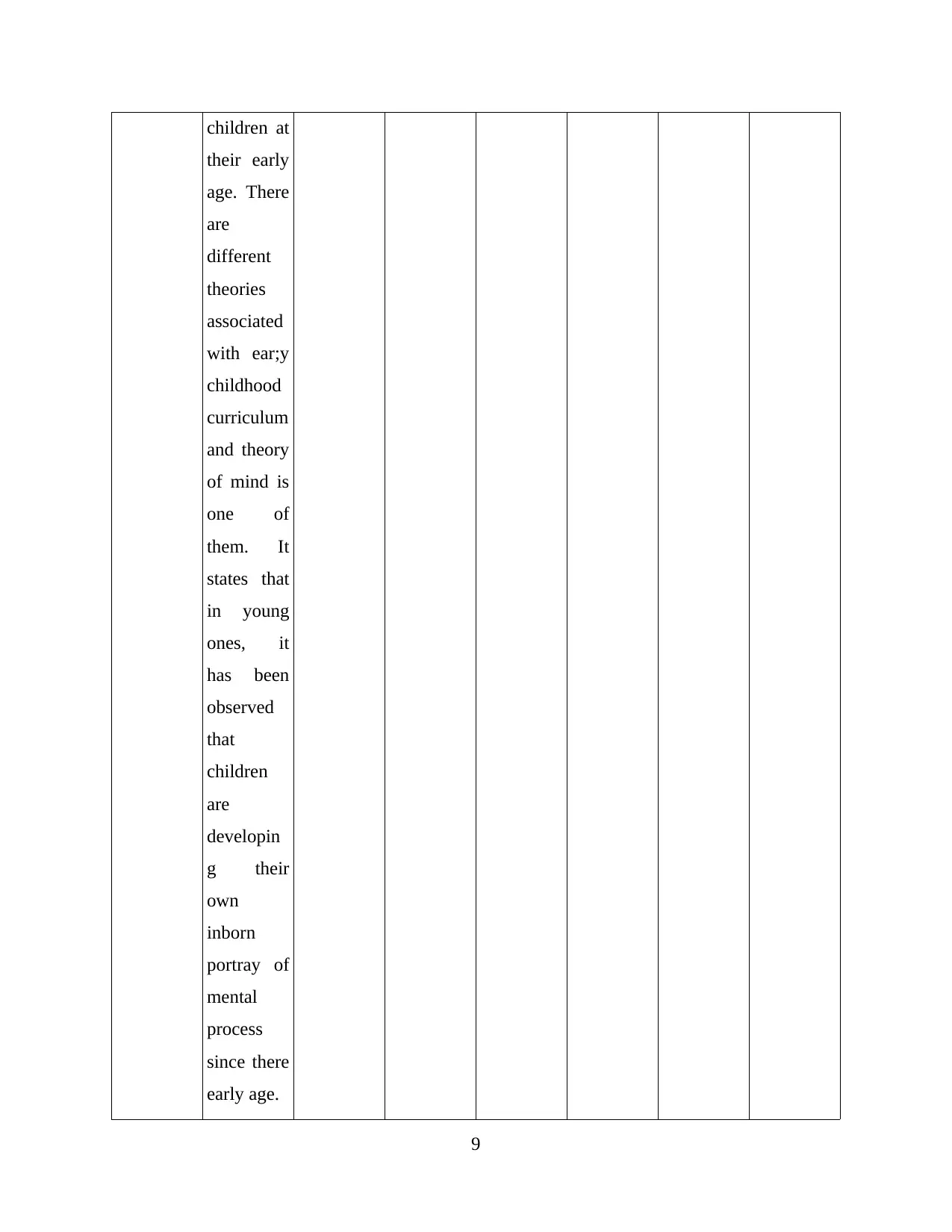
children at
their early
age. There
are
different
theories
associated
with ear;y
childhood
curriculum
and theory
of mind is
one of
them. It
states that
in young
ones, it
has been
observed
that
children
are
developin
g their
own
inborn
portray of
mental
process
since there
early age.
9
their early
age. There
are
different
theories
associated
with ear;y
childhood
curriculum
and theory
of mind is
one of
them. It
states that
in young
ones, it
has been
observed
that
children
are
developin
g their
own
inborn
portray of
mental
process
since there
early age.
9
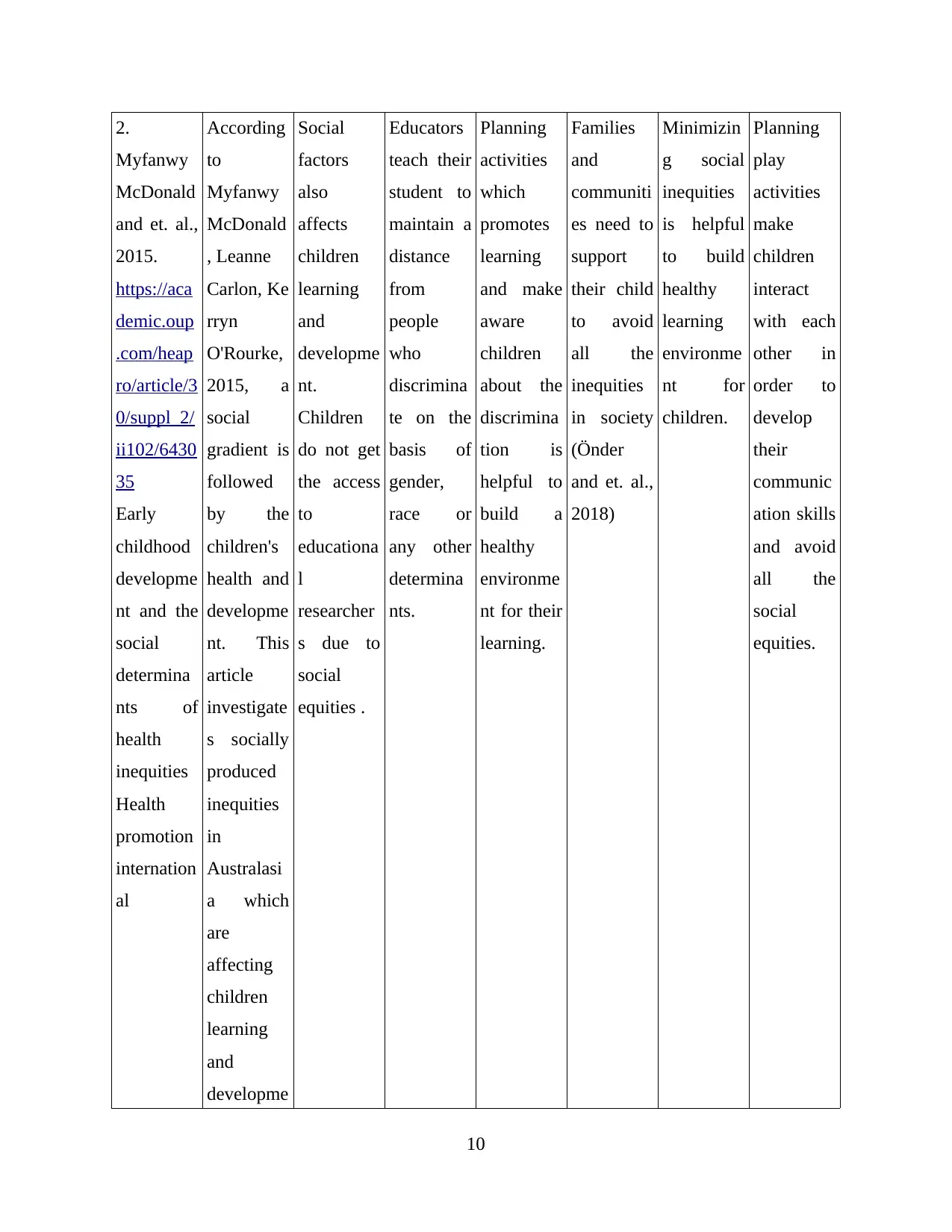
2.
Myfanwy
McDonald
and et. al.,
2015.
https://aca
demic.oup
.com/heap
ro/article/3
0/suppl_2/
ii102/6430
35
Early
childhood
developme
nt and the
social
determina
nts of
health
inequities
Health
promotion
internation
al
According
to
Myfanwy
McDonald
, Leanne
Carlon, Ke
rryn
O'Rourke,
2015, a
social
gradient is
followed
by the
children's
health and
developme
nt. This
article
investigate
s socially
produced
inequities
in
Australasi
a which
are
affecting
children
learning
and
developme
Social
factors
also
affects
children
learning
and
developme
nt.
Children
do not get
the access
to
educationa
l
researcher
s due to
social
equities .
Educators
teach their
student to
maintain a
distance
from
people
who
discrimina
te on the
basis of
gender,
race or
any other
determina
nts.
Planning
activities
which
promotes
learning
and make
aware
children
about the
discrimina
tion is
helpful to
build a
healthy
environme
nt for their
learning.
Families
and
communiti
es need to
support
their child
to avoid
all the
inequities
in society
(Önder
and et. al.,
2018)
Minimizin
g social
inequities
is helpful
to build
healthy
learning
environme
nt for
children.
Planning
play
activities
make
children
interact
with each
other in
order to
develop
their
communic
ation skills
and avoid
all the
social
equities.
10
Myfanwy
McDonald
and et. al.,
2015.
https://aca
demic.oup
.com/heap
ro/article/3
0/suppl_2/
ii102/6430
35
Early
childhood
developme
nt and the
social
determina
nts of
health
inequities
Health
promotion
internation
al
According
to
Myfanwy
McDonald
, Leanne
Carlon, Ke
rryn
O'Rourke,
2015, a
social
gradient is
followed
by the
children's
health and
developme
nt. This
article
investigate
s socially
produced
inequities
in
Australasi
a which
are
affecting
children
learning
and
developme
Social
factors
also
affects
children
learning
and
developme
nt.
Children
do not get
the access
to
educationa
l
researcher
s due to
social
equities .
Educators
teach their
student to
maintain a
distance
from
people
who
discrimina
te on the
basis of
gender,
race or
any other
determina
nts.
Planning
activities
which
promotes
learning
and make
aware
children
about the
discrimina
tion is
helpful to
build a
healthy
environme
nt for their
learning.
Families
and
communiti
es need to
support
their child
to avoid
all the
inequities
in society
(Önder
and et. al.,
2018)
Minimizin
g social
inequities
is helpful
to build
healthy
learning
environme
nt for
children.
Planning
play
activities
make
children
interact
with each
other in
order to
develop
their
communic
ation skills
and avoid
all the
social
equities.
10
⊘ This is a preview!⊘
Do you want full access?
Subscribe today to unlock all pages.

Trusted by 1+ million students worldwide
1 out of 29
Related Documents
Your All-in-One AI-Powered Toolkit for Academic Success.
+13062052269
info@desklib.com
Available 24*7 on WhatsApp / Email
![[object Object]](/_next/static/media/star-bottom.7253800d.svg)
Unlock your academic potential
Copyright © 2020–2026 A2Z Services. All Rights Reserved. Developed and managed by ZUCOL.





